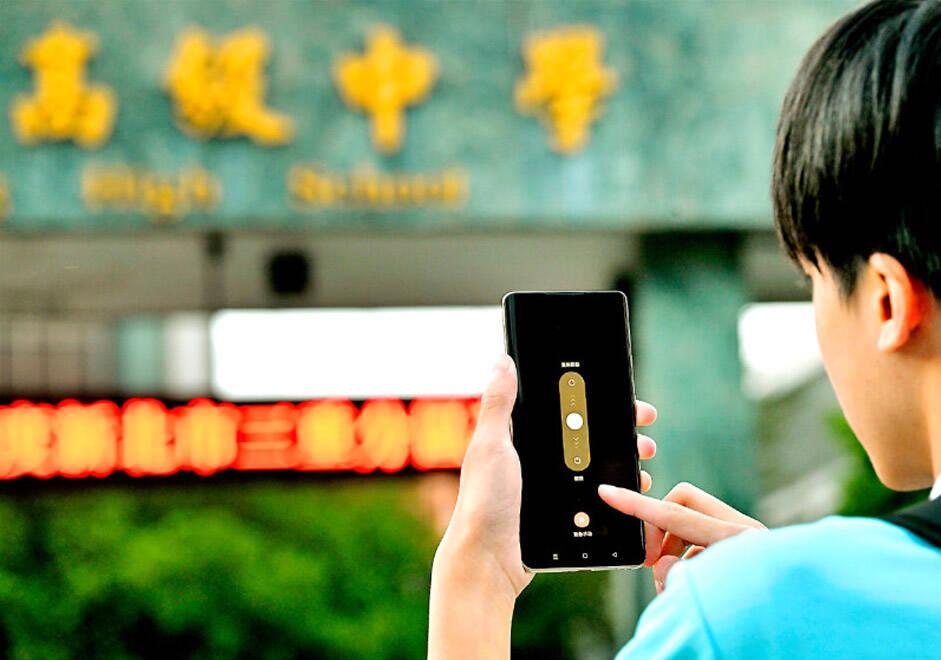The Ministry of Education today announced new draft guidelines for phone usage in schools, with stricter regulations for lower grades and flexibility for individual schools or classes to set their own rules.
A “centralized management” approach would be adopted for elementary and junior-high schools under the newly announced Guidelines for the Management of Students Bringing Mobile Devices to School Campuses of Senior High and Below (高級中等以下學校學生攜帶行動載具到校管理原).
School or individual classes would manage rules, but with details subject to approval by school boards, the guidelines state.

Photo: Taipei Times
As they remain minors, parents and guardians would still bear legal responsibility for their behavior and safety, they say.
If students need to bring mobile phones or other devices on campus, they must first obtain permission from a legal guardian, the rules state.
Regulations for high schools would have more flexibility, allowing students, parents and teachers to jointly decide on management methods, including when phones may be used on campus, although methods may not vary between classes.
High-school students are deemed to have “self-management abilities” and may bring devices on campus in accordance with school regulations, although schools are encouraged to inform parents of the rules.
The student group EdYouth in a recent statement said that device usage should only be managed during class hours to avoid over-regulation.
In response, the ministry today said that devices must be turned off or switched to airplane mode and stored away during class hours, except when used for educational purposes or emergency situations.
Current students are “digital natives” who have grown up with technology, which can be used to accelerate learning, it said.
However, there must be a balance to avoid over-reliance on personal devices, the harmful effects of social media and gaming addiction, the ministry added.
Additional reporting by Rachel Lin

The Coast Guard Administration (CGA) yesterday said it had deployed patrol vessels to expel a China Coast Guard ship and a Chinese fishing boat near Pratas Island (Dongsha Island, 東沙群島) in the South China Sea. The China Coast Guard vessel was 28 nautical miles (52km) northeast of Pratas at 6:15am on Thursday, approaching the island’s restricted waters, which extend 24 nautical miles from its shoreline, the CGA’s Dongsha-Nansha Branch said in a statement. The Tainan, a 2,000-tonne cutter, was deployed by the CGA to shadow the Chinese ship, which left the area at 2:39pm on Friday, the statement said. At 6:31pm on Friday,

The Chinese People’s Liberation Army Navy’s (PLAN) third aircraft carrier, the Fujian, would pose a steep challenge to Taiwan’s ability to defend itself against a full-scale invasion, a defense expert said yesterday. Institute of National Defense and Security Research analyst Chieh Chung (揭仲) made the comment hours after the PLAN confirmed the carrier recently passed through the Taiwan Strait to conduct “scientific research tests and training missions” in the South China Sea. China has two carriers in operation — the Liaoning and the Shandong — with the Fujian undergoing sea trials. Although the PLAN needs time to train the Fujian’s air wing and

The American Institute in Taiwan (AIT) put Taiwan in danger, Ma Ying-jeou Foundation director Hsiao Hsu-tsen (蕭旭岑) said yesterday, hours after the de facto US embassy said that Beijing had misinterpreted World War II-era documents to isolate Taiwan. The AIT’s comments harmed the Republic of China’s (ROC) national interests and contradicted a part of the “six assurances” stipulating that the US would not change its official position on Taiwan’s sovereignty, Hsiao said. The “six assurances,” which were given by then-US president Ronald Reagan to Taiwan in 1982, say that Washington would not set a date for ending arm sales to Taiwan, consult

A Taiwanese academic yesterday said that Chinese Ambassador to Denmark Wang Xuefeng (王雪峰) disrespected Denmark and Japan when he earlier this year allegedly asked Japan’s embassy to make Taiwan’s representatives leave an event in Copenhagen. The Danish-language Berlingske on Sunday reported the incident in an article with the headline “The emperor’s birthday ended in drama in Copenhagen: More conflict may be on the way between Denmark and China.” It said that on Feb. 26, the Japanese embassy in Denmark held an event for Japanese Emperor Naruhito’s birthday, with about 200 guests in attendance, including representatives from Taiwan. After addressing the Japanese hosts, Wang